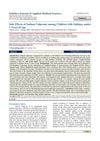
COVID-19 infection is highly related to increased hair loss, especially in women.
 7 citations,
September 2021 in “Anais Brasileiros De Dermatologia”
7 citations,
September 2021 in “Anais Brasileiros De Dermatologia” COVID-19 can cause temporary hair loss, often starting around 7-8 weeks after recovery, with factors like Vitamin D deficiency, other diseases, medication, and stress potentially contributing.
 January 2024 in “Annals of dermatology/Annals of Dermatology”
January 2024 in “Annals of dermatology/Annals of Dermatology” Weight loss can cause temporary hair loss, especially in women and older adults.
 25 citations,
August 2021 in “Irish Journal of Medical Science (1971 -)”
25 citations,
August 2021 in “Irish Journal of Medical Science (1971 -)” COVID-19 infection can significantly cause temporary hair loss.
 4 citations,
October 2022 in “Journal of family medicine and primary care”
4 citations,
October 2022 in “Journal of family medicine and primary care” Some people in Saudi Arabia experienced hair loss after the COVID-19 vaccine, more often in women and those without prior hair loss.
 15 citations,
September 2018 in “Medicine”
15 citations,
September 2018 in “Medicine” Childhood ptosis can vary from a minor cosmetic issue to a serious condition and may signal other health problems.
 1 citations,
May 2023 in “Scientific Reports”
1 citations,
May 2023 in “Scientific Reports” Most hospitalized COVID-19 survivors in the study experienced long-term symptoms, affecting their daily life and mental functions.
 1 citations,
September 2022 in “Journal of Medical Case Reports”
1 citations,
September 2022 in “Journal of Medical Case Reports” Rehabilitation therapy helped a severe COVID-19 patient regain muscle mass and return to normal life.
 January 2012 in “The Year book of dermatology”
January 2012 in “The Year book of dermatology” Finasteride 5mg/day improves hair loss in normoandrogenic Asian women.
 41 citations,
December 2008 in “International Journal of Dermatology”
41 citations,
December 2008 in “International Journal of Dermatology” South Korean women with hair loss have lower hair density and thickness compared to healthy women.
 72 citations,
February 2011 in “American Journal of Biological Anthropology”
72 citations,
February 2011 in “American Journal of Biological Anthropology” The conclusion is that recognizing hair growth cycles can improve the precision of dietary and health assessments from hair analysis.
 22 citations,
April 2006 in “Journal of The American Academy of Dermatology”
22 citations,
April 2006 in “Journal of The American Academy of Dermatology” More research is needed to determine if iron deficiency causes hair loss.
 January 2021 in “bioRxiv (Cold Spring Harbor Laboratory)”
January 2021 in “bioRxiv (Cold Spring Harbor Laboratory)” Mothers have more hair proteins than their children, with age-related differences in protein patterns, and some proteins in hair could indicate early childhood development.
 January 2019 in “Journal of cosmetology & trichology”
January 2019 in “Journal of cosmetology & trichology” L-Cystine and L-Cystine with Kera-Diet® safely improved hair and nail quality in healthy women.
 December 2022 in “International Journal of Biomedicine”
December 2022 in “International Journal of Biomedicine” Androgens may worsen COVID-19 and hair loss could indicate the disease's severity.
 5 citations,
October 2018 in “American Journal of Clinical Dermatology”
5 citations,
October 2018 in “American Journal of Clinical Dermatology” Skin problems are common after stem cell transplants, and early treatment by dermatologists can improve patient outcomes.
 13 citations,
May 1993 in “International Journal of Dermatology”
13 citations,
May 1993 in “International Journal of Dermatology” The paper suggests that telogen effluvium, a type of hair loss, may be a long-lasting condition triggered by stress or illness in people whose hair growth is unusually synchronized.
 4 citations,
March 2021 in “International Journal of Dermatology”
4 citations,
March 2021 in “International Journal of Dermatology” COVID-19 and related stress may increase hair loss known as Telogen effluvium.
 January 2012 in “Yearbook of Dermatology and Dermatologic Surgery”
January 2012 in “Yearbook of Dermatology and Dermatologic Surgery” Taking finasteride daily can effectively and safely increase hair density and thickness for women with hair loss.
 9 citations,
January 2015 in “Skin appendage disorders”
9 citations,
January 2015 in “Skin appendage disorders” The article suggests that the belief in common postpartum hair loss lacks sufficient evidence and may be overestimated.
 July 1997 in “Journal of Cutaneous Medicine and Surgery”
July 1997 in “Journal of Cutaneous Medicine and Surgery” Finasteride significantly increases scalp hair and prevents hair loss in young and middle-aged men.
 21 citations,
January 2016 in “Skin appendage disorders”
21 citations,
January 2016 in “Skin appendage disorders” Alfredo Rebora suggested a new, easier way to classify hair loss in Telogen Effluvium, adding a type possibly related to autoimmune diseases.
 July 2024 in “Dermatology Practical & Conceptual”
July 2024 in “Dermatology Practical & Conceptual” COVID-19-related hair loss may have unique features compared to hair loss from other causes.
 34 citations,
July 1999 in “Journal of The European Academy of Dermatology and Venereology”
34 citations,
July 1999 in “Journal of The European Academy of Dermatology and Venereology” Iron deficiency is not a significant cause of hair loss in women.
 23 citations,
July 2018 in “BMC Complementary and Alternative Medicine”
23 citations,
July 2018 in “BMC Complementary and Alternative Medicine” Certain herbal combinations in traditional Chinese medicine might be effective for treating hair loss, focusing on liver or stomach health.
 7 citations,
January 2009 in “Immunological investigations”
7 citations,
January 2009 in “Immunological investigations” A 3-year-old boy lost all his hair due to a rare reaction to phenobarbital, but it grew back after steroid treatment.
 March 2022 in “Research Square (Research Square)”
March 2022 in “Research Square (Research Square)” A girl with severe hair loss saw hair regrowth after using cannabis.
 July 2020 in “Scholars journal of applied medical sciences”
July 2020 in “Scholars journal of applied medical sciences” Sodium valproate caused vomiting, hair loss, loss of appetite, abdominal pain, weight gain, and anemia in young children with epilepsy.
 10 citations,
January 1994 in “Advances in pharmacology”
10 citations,
January 1994 in “Advances in pharmacology” New drugs targeting DNA enzymes show promise for cancer treatment but have side effects like immune system suppression and hair loss.
 July 1999 in “Journal of The European Academy of Dermatology and Venereology”
July 1999 in “Journal of The European Academy of Dermatology and Venereology” Bath PUVA therapy works well for a skin condition without as many cancer risks and is cheaper, and iron deficiency might not cause female hair loss.






























